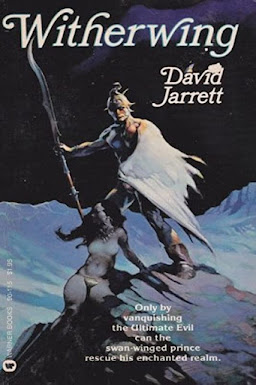This book is the first of two, written by Casey Flynn. [Bantam Spectra Fantasy, 1991, 259 pages] It is supposedly based on pre-Christian Celtic mythology. But it turned out to be much different than I expected, not a very mythic tale at all, or at least there are no Gods as the title implies.
It concerns a people led by Nemed, calling themselves Nemedians. They have fled their harsh homeland in attempt to find a 'Blessed Land' for their people. The novel begins when the ships first land (I'm assuming it's Ireland, of course) and they find an abandoned settlement, proving that once people lived there. They have been gone for some time before Nemed arrives. Soon the Nemedians are introduced to the Fomor, a race of people who are native to the area, yet do not seem to live on the Island. The Fomor demand tribute from the Nemedians, namely all of their children. This disagreement spurns on the whole rest of the novel.The character Dagda is the protagonist, the biggest and strongest Nemedian. He was originally led to the camp by a being of shining lights. He leads most of the expeditions while Nemed stays with the people.
Dagda's wife Moira, is affected by some poison the Fomor put into the lake on their wedding night. Six months later, she gives birth to some deformed biological egg, from which massive blood sucking leeches
come forth. This is a very disgusting part of the novel. Moira leaves the camp after this, and wanders the woods alone as The Morrigan, coming back to help Dagda near the end of the novel.
The magic in this novel is all over the place. From vials of unidentified poisons, to form-shifting shining beings, to summoning a storm. There are also more science or technology based events, which I felt were out of place, considering the mythic setting. There is a massive being in armor that can shoot lasers. There are descriptions of things such as elevators and syringes, that are not stated outright for the reader, as the characters would have no such knowledge. In addition, things that appear to be mutants are among the Fomor. These are misshapen creatures, or people with the heads of animals.
The Fomor wish to use Nemedian children to continue breeding their race, without mutation. After many women and children are taken captive, the Nemedians march with all of their remaining warriors to the Fomor stronghold.
Over the course of the novel, the Nemedians are continually battered, their numbers are constantly thinning, due to plague(unleashed upon them by the Fomor), battle, and survival. From about 1000 people at the beginning of the novel, only about 200 remain at the end, mostly women and children who were rescued from the Fomor Though they triumph over the Fomor this time, they are too weak to do much else, with so few warriors. Dagda takes 3 ships of people to the west to search for new lands. This is where the novel ends.
The writing is pretty simple. We are given very little backstory about the characters, and their motivations don't seem to have much depth to them. There is a second book of this series, but I don't think I'll read it anytime soon.
---

